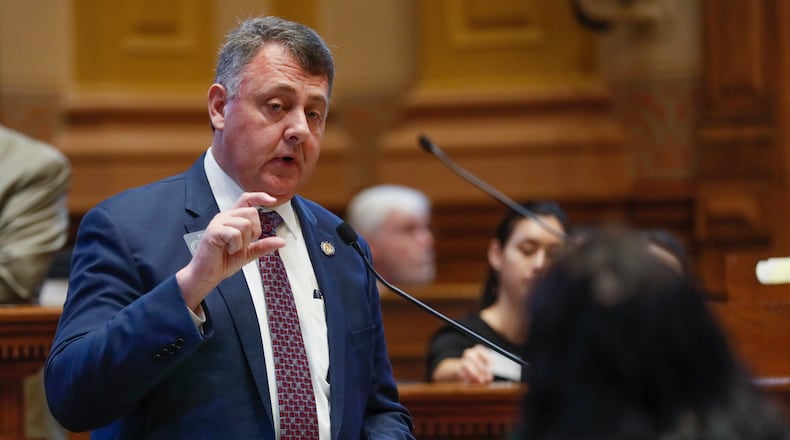Fifteen years ago, state lawmakers enacted sweeping tort legislation that delighted doctors, hospitals and the insurance industry. This year, they’re back at it again, pushing new proposals aimed at stifling plaintiffs’ litigation and curbing big jury awards.
Sponsors of two bills recently introduced in the Legislature say more changes are needed to stop runaway jury verdicts and correctly apportion blame when someone is injured and sues for compensation. Opponents call the legislation an assault on the U.S. Constitution’s guarantee of a citizen’s right to a trial by jury.
The legislation is sure to spark heated debate under the Gold Dome and pits big business interests and the insurance industry against the state’s network of influential trial lawyers.
"I suspect it will be an all-day fight on the floor when it gets there," said the bills' chief sponsor, Sen. Steve Gooch, R-Dahlonega.
Gooch has introduced Senate Bill 390 and Senate Bill 415, the latter of which is a similar, but more limited, version of SB 390. Proponents of SB 415 made sure it bypassed the Senate Judiciary Committee, which has trial lawyers as members, and was instead assigned to the Insurance and Labor Committee, where it received a warm reception.
At a Thursday press conference, Gooch said he hopes the committee will approve SB 415 sometime next week.
“The reputation of Georgia’s civil justice system is being called into question,” said Gooch, who owns an environmental services business. “The system must change if Georgia is going to continue to be a good place to do business and to live.”
The Washington-based American Tort Reform Association recently ranked Georgia sixth on its top-10 list of the nation’s “Judicial Hellholes.” Georgia, its annual report said, is a state where “outrageous nuclear verdicts have become the norm.”
“We need to pass SB 415 because Georgia’s legal system is broken,” said Nathan Humphrey, the National Federation of Independent Business’ state director. “Gooch’s bill would do a lot to discourage frivolous claims and lawsuit abuse, making it easier for small-business owners to defend themselves.”
Statesboro lawyer Dan Snipes, the president of the Georgia Association of Trial Lawyers, said the proposals are unnecessary.
“Georgia has a very fair and balanced court system,” Snipes said. “This bill is a sweeping overthrow of our judiciary that benefits insurance companies and big business at the expense of our citizens who have been harmed by the negligence of others.”
It’s unclear whether the Legislature’s enthusiasm for tort changes is as robust as it was 15 years ago. The Tort Reform Act of 2005 steamrolled through the General Assembly and was hastily signed into law by then-Gov. Sonny Perdue just two days after the end of the session.
That controversial bill capped medical malpractice pain-and-suffering awards at $350,000 and made it much more difficult for an injured patient to prevail in a lawsuit involving an emergency room procedure. In 2010, the Georgia Supreme Court found the $350,000 cap unconstitutional and struck it down.But that same year, the state high court upheld the emergency room provision.
Over the past year, a study commission headed by Sen. John Wilkinson, R-Toccoa, a retired teacher and farmer, held hearings across the state. It recommended capping punitive damages in product liability cases at $250,000, but that did not make it into Gooch's legislation.
Some of SB 415’s proposals are straightforward, such as requiring a judge to give jurors printouts of his or her instructions on the law before deliberations begin. Others, however, will face strong opposition.
One provision would prevent trial lawyers from being able to argue to the jury the monetary value of a victim’s pain and suffering or the value of someone’s life in a wrongful death case. Another would allow jurors to know whether someone injured in a car accident was wearing his or her seat belt.
Gooch said the seat belt requirement simply lets juries know whether the injured party was acting responsibly.
But Snipes, the Statesboro lawyer, said the first thing most people do in an accident — unless they are catastrophically injured — is take off their seat belts and get out of the car, particularly when someone else might be hurt. As for no longer being able to make monetary arguments, he said, “It takes away the ability of a lawyer to argue a case based on things that are already in evidence.”
Another controversial provision involves premises liability cases. These involve someone who is attacked on property owned by a business or an individual and then files suit against the property owner and the assailant.
“The juries are finding fault against private property owners when in fact the private property owner had nothing to do with the crime or the injury that occurred on the property,” Gooch said in a recent interview.
In recent years, a number of Georgia juries have returned multimillion-dollar verdicts against property owners who were shown to have been aware of crime on their premises but did not do enough to prevent it. One provision of SB 415 entitles a plaintiff to recover damages only when the landowner “had actual knowledge of the specific threat of imminent harm” and reasonably could have prevented it.
“This changes the duty business owners owe to people invited on their property,” Snipes said. “How often does someone have actual knowledge a crime is about to be committed? This is an attempt to create absolute immunity for someone’s negligence.”
About the Author
Keep Reading
The Latest
Featured


